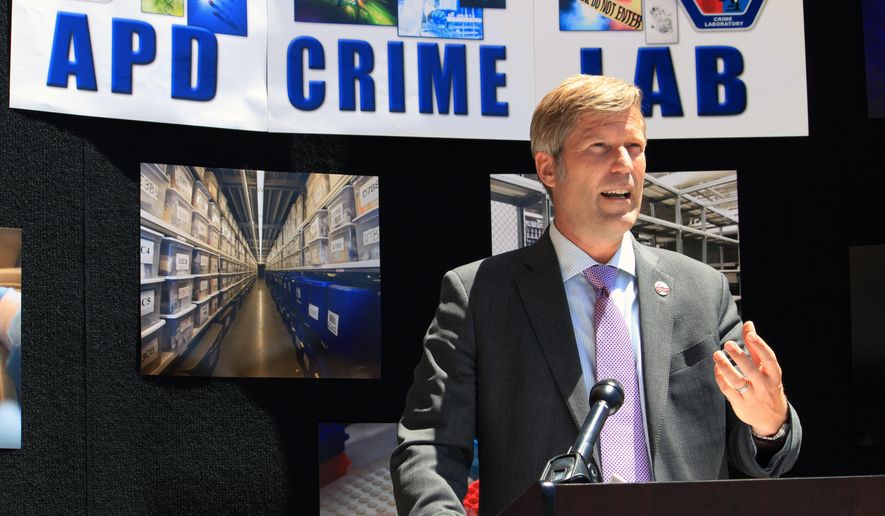ALBUQUERQUE, N.M. (AP) - Officials in New Mexico’s largest city said Friday they have cleared a backlog of thousands of untested rape evidence kits as part of an endeavor that has spanned more than three years.
Albuquerque Mayor Tim Keller was flanked by law enforcement officials and advocates who work with survivors of sexual assault as he marked the accomplishment Friday. He and other officials said every kit submitted for testing has been returned to the police department’s crime lab and officers are investigating cases as a result.
Keller pointed to a photograph that showed boxes of evidence kits lining shelves at the police department’s forensic science center.
Another image showed bare shelves now that the backlog has been cleared.
“This for us is obviously a symbolic picture, but every one of those boxes is a victim and every one of those boxes tells a story that ultimately should lead to justice,” Keller said, after recalling when he helped to ship off one of the last boxes to be processed last year amid the coronavirus pandemic.
He said the city has developed the right processes and has the right systems and advocates in place to ensure a backlog never happens again. In fact, police protocols require evidence from rape and sexual assault cases to be processed within 90 days. An online training program also has been developed for law enforcement officers who interview and work with victims in such cases.
Millions of dollars have been poured into addressing New Mexico’s backlog overall, which totaled more than 5,400 untested evidence kits from rapes and other sexual assaults when the work began years ago. New Mexico led the nation in the number of untested kits per capita, far outpacing other states.
The crime lab in Albuquerque carried the bulk of the backlog, with nearly 75% of the untested kits. Some of the cases in Albuquerque police’s backlog had dated back to the 1980s. Many also included victims who were minors, the mayor said.
During his tenure as state auditor, Keller ordered a special inquiry aimed at identifying the root causes of the testing backlog. The results, released in 2016, showed that one-fifth of the kits reviewed as part of the statewide audit went untested because of a perceived lack of credibility on the part of the victim. Another 21% went untested due to either the loss of contact with a victim or a lack of cooperation.
Of the reviewed cases that originated in Albuquerque and Bernalillo County, officials said Friday that 3,152 DNA profiles were generated and 1,318 of those were eligible to be entered into crime databases. As a result, there have been 518 hits and the information has been forwarded to detectives with the Albuquerque Police Department and the Bernalillo County Sheriff’s Office.
Last spring, a few dozen private attorneys volunteered to act as special prosecutors and help the district attorney’s office try defendants identified through the testing. The district attorney’s office also is using grant money to pay for prosecutors in the office to work on the cases.
Officials said previously that they expected a couple hundred cases to be generated over the coming years due to the testing.
The district attorney’s office provided a list Friday, showing 13 of the 44 suspects who were identified as a result of the efforts so far have been convicted and more than a dozen others are awaiting trial.
The Albuquerque Sexual Assault Nurse Examiners Collaborative also created a program for providing notification to survivors on the status of their backlogged evidence kits.
Advocates reiterated Friday that the effort in Albuquerque and elsewhere to address the backlog sends a message to survivors that their cases matter.
Officials and advocates also acknowledged that testing was only the first step.
“We’re going to keep talking about this,” said Sarita Nair, the city’s chief administrative officer. “It wasn’t over when we sent the last kit. It wasn’t over when we got the last kit back. It will only be over really when we’ve worked to bring justice to everyone who caused one of this kits to happen in the first place.”




Please read our comment policy before commenting.